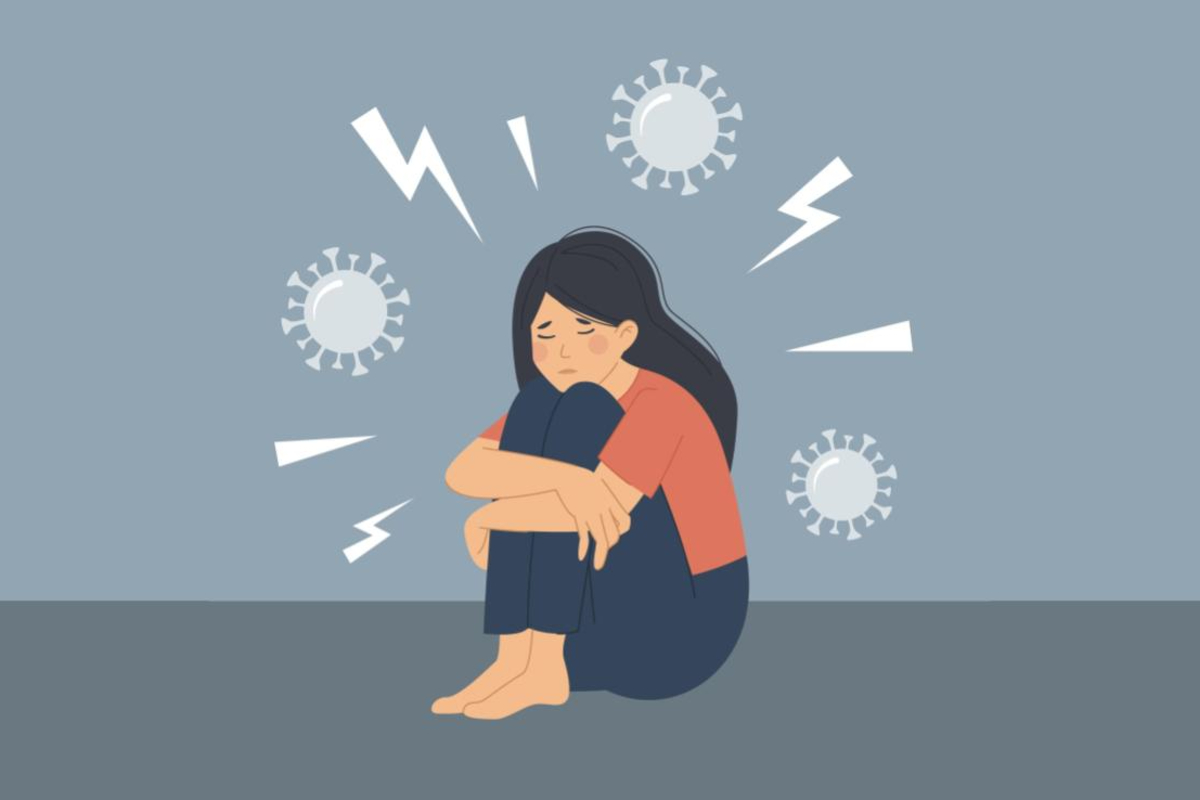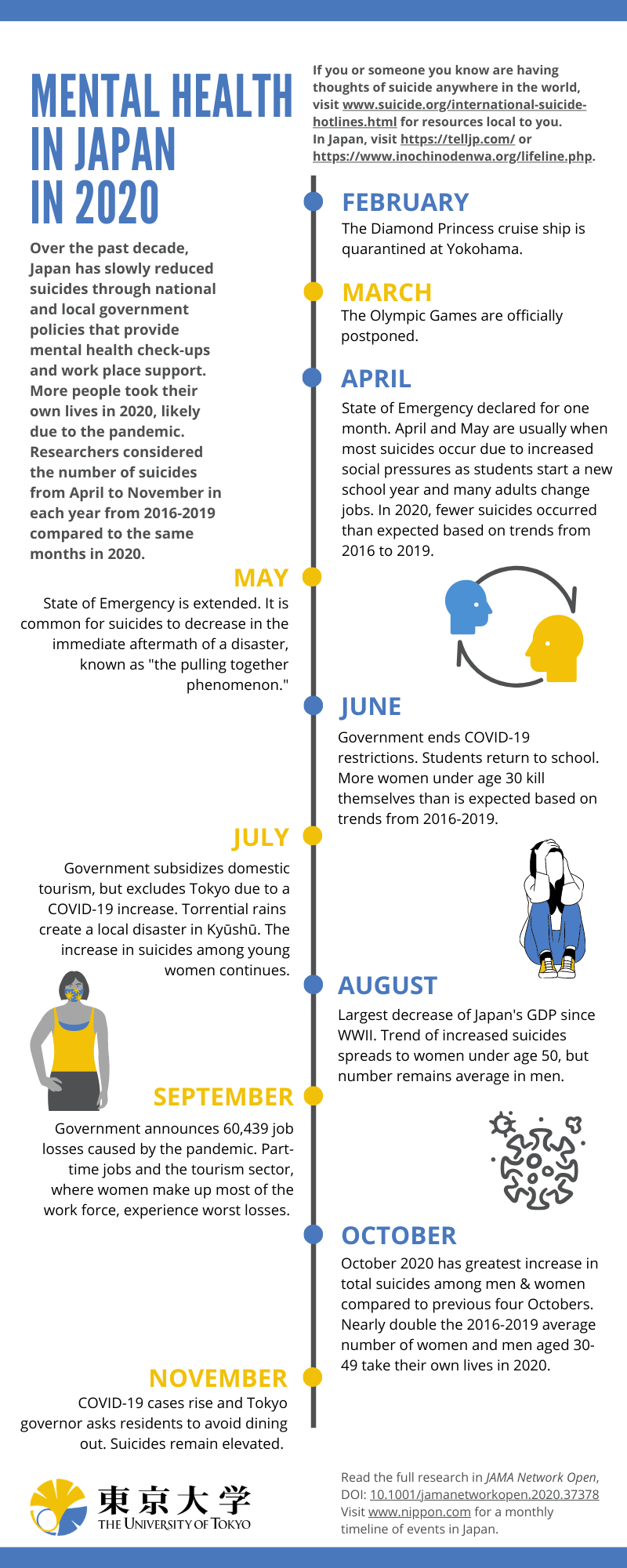
In the past year in Japan, major changes in mental health were seen among young women, who may be missed by existing suicide prevention policies. ©kanvictory/AdobeStock.com
More people than expected ended their own lives in 2020 in Japan, overturning a decadelong slow decline in the nation's annual number of suicides, according to a new analysis by public health experts at the University of Tokyo. The increase in suicides was especially pronounced among women younger than 30, potentially due to the COVID-19 pandemic's disproportionate effect on part-time and travel industry employees.
"This trend of increased suicides among young women and university and high school students is very different from before COVID-19. Before COVID-19, if suicides increased, we would expect more deaths of middle-aged men," said Dr. Haruka Sakamoto, an expert in public health at the University of Tokyo and first author of the research publication in the Journal of the American Medical Association (JAMA) Network Open.
The number of people who died by suicide in Japan peaked in 2003 with 34,427 total deaths, held relatively steady through 2009, and then slowly declined to 20,169 deaths in 2019, an all-time low since 1978 when the government began compiling national suicide statistics (link to PDF in Japanese).

This infographic timeline provides a broad outline of economic and social changes in 2020 due to the COVID-19 pandemic in Japan and changes in the country's suicide rates. ©Caitlin Devor, The University of Tokyo CC BY
In the late 2000s, suicides increased sharply among men in their 50s, many of whom were understood to be affected by the "Lehman shock" (the financial crisis following the bankruptcy of the Lehman Brothers company in 2008). Since then, depression and suicide in Japan have been widely viewed as diseases caused by overwork or work-related stress. In 2016, Japan's Basic Act on Suicide Prevention law required national and local governments to develop specific plans to reduce suicides.
"If they have a mental health problem, maybe they still feel some social shame, but now people know they can ask for rest from their employer," Sakamoto explained.
Sakamoto says that most suicide prevention policies are targeted to full-time employees of large companies. Anyone without a full-time job, especially young people who do not regularly visit medical clinics for physical health complaints, can be easily missed by current suicide prevention efforts.
In their recent analysis, Sakamoto and colleagues examined month-by-month differences in suicides from April to November of 2016-2019 versus April to November of 2020. This month-by-month analysis allowed researchers to account for the rapidly changing social conditions related to the pandemic.
Fewer suicides than expected occurred in April and May 2020 when Japan was under an official state of emergency.
"Our hypothesis to explain the decrease in suicides in April and May is that normally there is an increase in suicides because of people starting a new school year or a job change. The state of emergency delayed that normal time of change, so suicide rooted in school or working environment did not occur as usual," said Sakamoto.
The April-May decline in suicides is also expected based on the widely documented "pulling together phenomenon" in societies around the world as people support one another in the immediate aftermath of natural or national disasters. Eventually, this sense of community cohesion fades, the decline in suicides reverses to a brief spike, and then suicides return to their pre-disaster normal rate.
In July 2020, the number of women killing themselves in Japan started to increase, especially in those younger than 30, and remained higher than expected through November. Between 2016 to 2019, an average of 70 women under age 30 died by suicide each July, but 96 women did so in 2020. October was the deadliest month for women of all ages. An average of 486 total women took their own lives the previous four Octobers, but 826 total women did so in October 2020.
The total number of men taking their own lives did not rise significantly until October. An average of 1,096 men of all ages killed themselves each October from 2016 to 2019, but 1,246 total men did so in October 2020. Most of the increase was among men aged 30 to 49.
"If people feel the pandemic can finish soon, they can fight to maintain their business. But around October, globally we saw a resurgence of COVID-19, so maybe people felt like the situation will get worse soon in Japan too. Probably with this negative atmosphere in October, this is why there was such an increase in suicides that month," said Sakamoto.
Although the total number of suicides is higher in men, researchers say that the sudden and unexpected increase in younger women is especially concerning. Japan's current suicide prevention strategies are unlikely to catch this demographic, and the pandemic's effect on part-time, food service or restaurant workers, and tourism, travel and entertainment sector jobs — where young women make up a significant portion of the workforce — is unlikely to recover anytime soon.
"Now the government needs a new policy for women and university students added to the current overall suicide program," said Sakamoto.
The relationship between biology, external environments, depression and suicide have always been difficult for medical science to understand, but experts say the pandemic's environment of isolation, stress and general dread can create mental illness.
"Even now during COVID-19, not every part-time worker has a mental health problem and it is still very rare to kill yourself. Mental health problems are biological issues, but environment can strongly affect the biological part. Without COVID-19 pressures, I think most of these women who killed themselves in 2020 would not have had mental health problems," said Sakamoto.
Parts of Japan, including Tokyo and Osaka, re-entered a state of emergency at the start of January 2021. National suicide statistics are made rapidly available in Japan, so researchers are continuing to watch each month's data as it becomes available.
"No one knows when we can enjoy daily life again, so the pandemic's effects on mental health and suicide will not end soon," said Sakamoto.
UTokyo students can find mental health resources at the Student Counseling Center (学生相談所) and the International Student Support Room in English, Chinese and Japanese.
If you or someone you know are having thoughts of suicide anywhere in the world, visit www.suicide.org/international-suicide-hotlines.html for a list of local resources. In Japan, the Tokyo English Lifeline (TELL) provides free and anonymous English-language crisis counseling via phone at 03-5774-0992 or online. For Japanese-language services, call 0570-064-556 for the nationwide Mental Health Telephone Counseling service (健康相談統一ダイヤル). For a list of services in each prefecture, visit https://www.inochinodenwa.org/lifeline.php. Befrienders International has offices across Japan listed on their website.
In an emergency, call 119 for immediate assistance.






